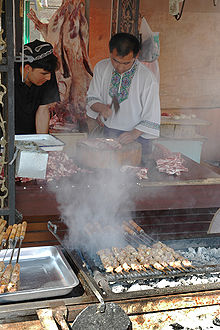- Chuanr
-
Part of a series of articles on
Cuisine Lamian •
Chuanr •
Beef noodle soup •
Suan caiChuanr, sometimes referred to as chuan, (Chinese: 串儿, pinyin: chuànr; "kebab"; كاۋاپ kawap in Uyghur) are small pieces of meat roasted on skewers. Chuanr originated in the Xinjiang province of China and in recent years has spread throughout the rest of the country, most notably in Beijing, Tianjin, and Jilin where it is a popular street food. It is a product of the Chinese Islamic cuisine of the Uyghur people and other Chinese Muslims.
Chuanr are small pieces of meat on skewers roasted over charcoal or, sometimes, electric heat. It is sometimes also cooked by deep frying in oil (popular in Beijing). It can be classified as a type of kebab. Chuanr was traditionally made from lamb (yáng ròu chuàn, 羊肉串), which is still the most common, but now, chicken, pork, beef, and various types of seafood can also be used. Especially in touristy areas, chuanr can be found made with various insects and bugs, birds, and other exotic animals. In general, chuanr may be spiced according to preference, but generally cumin seed (孜然, zīrán), dried pepper flakes, salt, and sesame or sesame oil are sprinkled or brushed onto it. Another popular incarnation is mantou or steamed bun chuanr; it is commonly brushed with a sweet bean paste (甜豆酱, not to be confused with sweet red bean paste), and its taste serves as a foil to the often spicy meat chuanr.
In Tianjin, chuanr is often served with small round breads (馅饼, xiànr bǐng), also grilled with the same spices. Xiànr bǐng technically means "pie" or "filled bread" -- after cooking bread and meat, the bread is split open and chuanr meat is put inside, then eaten together.
See also
Categories:- Chinese Islamic cuisine
- Barbecue
- Skewered foods
- Chinese cuisine stubs
- Meat stubs
Wikimedia Foundation. 2010.



